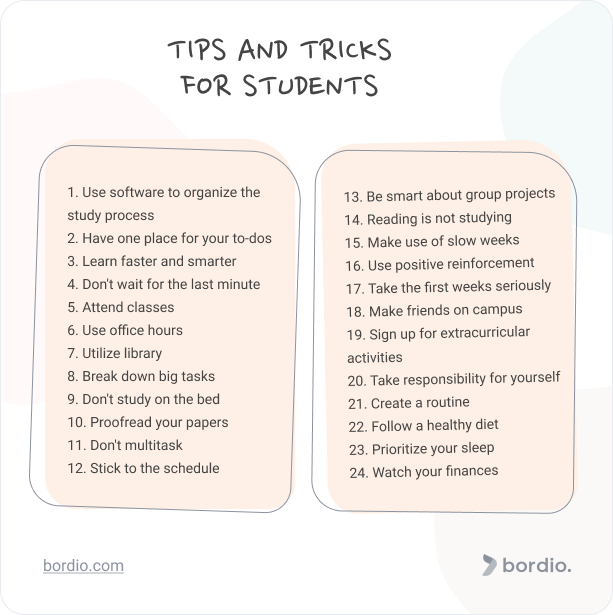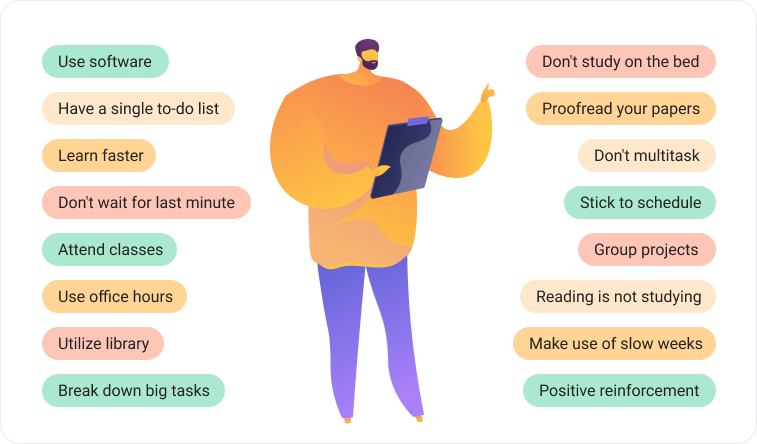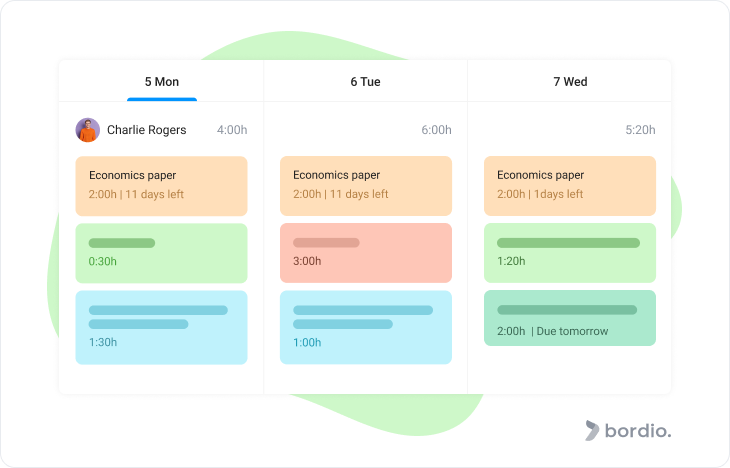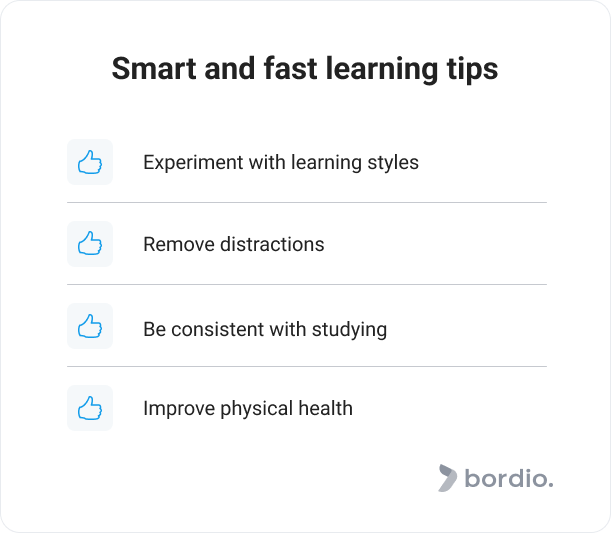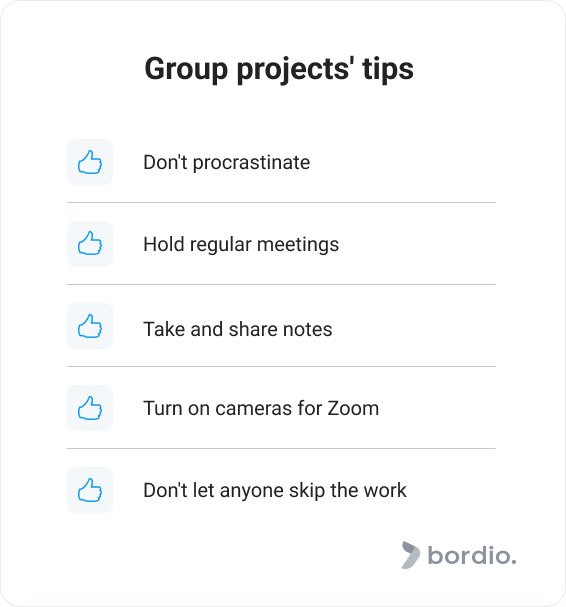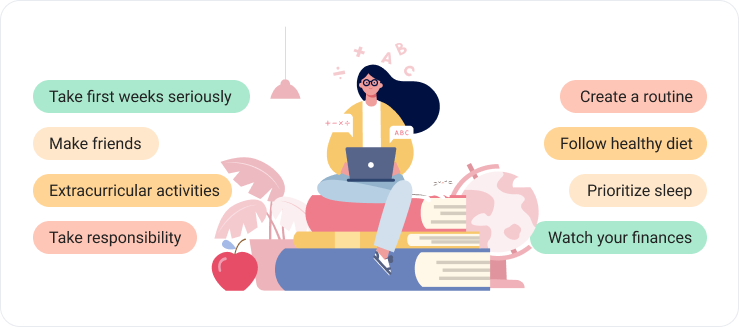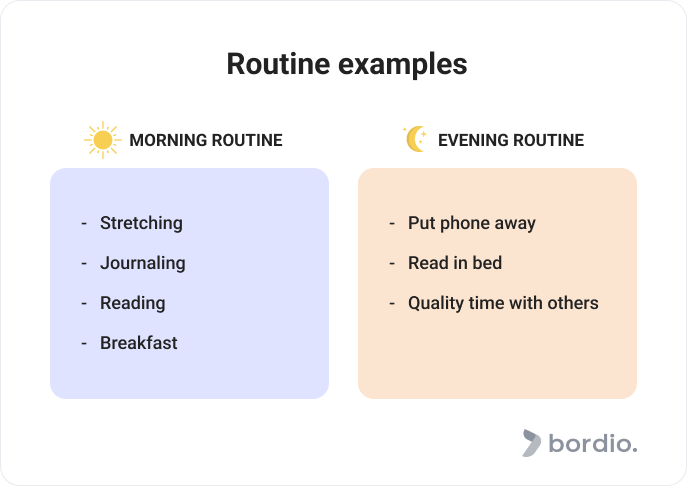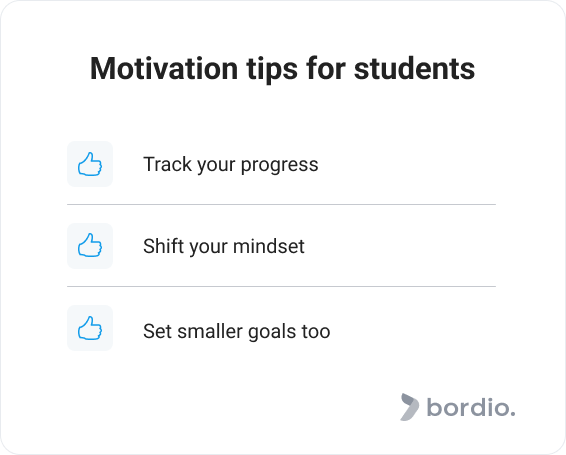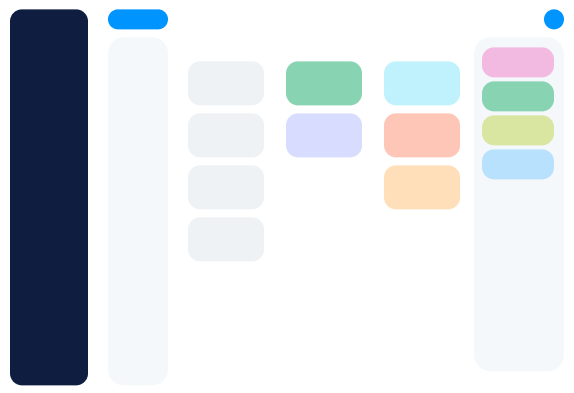Two students can study the same classes and graduate with the same diploma but have very different experiences.
The difference often lies in students’ habits and how they embark on the college journey.
Today we will share the best tips and tricks and key points that would help both freshmen and experienced students going back to uni for another academic year.
Tips for students on optimizing the study process
There are many ways you can reach academic success, one of which is through optimizing your study process.
#1 Use software to ogranize your study process
Bordio, for example, has a powerful calendar where you can schedule all your to-dos in the daily work tracker and a waiting list in best the project management tools for all assignments and tasks that are too far to schedule yet but mustn’t be forgotten. Also, you can assign time blocks to the task and plan them out to work on the task. For example, if you need to submit a paper in 2 weeks on Friday, and it is estimated to take you 6 hours, schedule 3 2-hour time blocks during the course of the next 2 weeks to ensure you have enough time saved to work on the paper.
It might be easy to push assignments until the last minute and still get good grades sometimes, but higher education doesn’t work like that.
Put a big paper calendar on the wall next to your desk and mark all crucial deadlines and events there. You can download one of Bordio’s monthly and yearly calendars for that.
#2 Have one place for all your to-dos
Don’t create ten different task lists and use multiple apps. Spreading yourself across multiple to-dos will only lead to confusion, poor planning, and, as a result, poor student performance. Use one advanced time planner.
Have planning sessions, e.g. every Sunday, where you plan the schedule for the next week. Go through each class, see what’s coming up and due, check personal commitments, and make sure you have time for everything.
Additionally, review your plans for the next day the night before, and create a daily schedule. You will be less likely to procrastinate and waste time with a clear list of goals and priorities.
Tip: We have tons of articles on organization. Read about Organizing Your Gmail, Google Calendar, Google Drive, and Home Office to improve different areas of your life.
#3 Learn Faster
It’s virtually impossible to improve student performance without upgrading the way one learns.
There are many more tips for learning faster and understanding what works for you in our Learning Fast Tips And Strategies guide.
Here are the key points from the guide that you can follow to learn not harder, but smarter:
- Experiment with learning styles. Don’t stick to one type of learning just become you see other students do it. Try them all: visual, auditory, kinesthetic, and reading or writing.
- Remove distractions. Close all tabs that are not study-related, turn off notifications, and go to a quiet place where no one talks to you.
- Be consistent. It’s better to have shorter daily study sessions than a single long one on Sunday. Your brain will be more likely to remember the material and it will take you less time.
- Work on physical health (sleep and eat well, remember to rest, and get moving) and mental health (practice meditation, try to maintain a positive attitude, and avoid too much stress). You can’t learn fast if you feel bad, mentally or physically.
#4 Don’t leave it until the last minute
By now, you are probably sick and tired of hearing about the importance of time management. However, it really is the magic pill that will help you elevate your learning and improve your academic life.
Even if your assignment is not due for another three weeks, start working on it today. There is less pressure to get everything done, and you can start by reviewing the task and creating a plan. Once that is done, the assignment already feels much more doable and you are likely to finish it on time without pulling an all-nighter. You can track everything in your time management systems.
Work on a habit of working a little on all assignments in advance. It will make a world of a difference, and good grades will follow.
#5 Go to classes
Do not skip classes unless you have a really good excuse. And no, being sleepy from the party last night or hating this one professor’s teaching style doesn’t count.
Learning through classes is very powerful because you are interacting with the professor, get to ask questions, participate in class discussions, and hear about others’ unique experiences that you can’t find in the books.
You are also able to work together with other college students, learn from them, and get inspired to study more. After all, a little bit of healthy competition doesn’t hurt.
When you skip classes, you can promise yourself you’ll catch up later, but it is much harder, especially if you have self-discipline challenges that push you to avoid classes, to begin with.
#6 Make use of office hours
Most professors will schedule office hours to meet with students.
Hardly anyone makes use of this wonderful opportunity, and we encourage you to be an exception. Go there with questions on assignments, advice about academic or career prospects, or anything else college-related.
Trust us, professors will be more than happy to help or point you in the right direction. Especially when you’re not coming to them begging for help one day before the exams.
#7 Study in the library
Libraries are great places for efficient studying.
They’re quiet, there’s no Netflix, and everyone around you is focused on doing their work. Learning at home or in the coffee shop is fine too, but there are so many distractions there, making you much more likely to procrastinate and not get your work done.
#8 Break big assignments into smaller tasks
Big tasks can be intimidating and cause you to procrastinate. Whenever you get a large assignment, study it in detail, work out a plan to complete it, and write down the steps you need to take. Each step will be a smaller task that you can schedule to work on. At some point, you will realize that a bunch of smaller tasks resulted in you finishing a big assignment without even noticing.
#9 Don’t study on your bed
If you can’t escape spending most of your time in your dorm room, be strategic about it! You will be surprised how much our brains adapt and how sensitive they are to us separating the space mentally.
Use your desk to study, and use your bed to rest. Your brain will adapt quickly and it will help you focus once you get to work and relax when your study day is finished. Do the same with time – allocate hours that you don’t study no matter what, and have time slots when you study most of the time.
It’s not always possible but do it as much as you can. You can even take it one step further and change your clothes when you study at home.
#10 Proofread your papers before handing them in
Always read through your papers before passing them to professors! There’s really no need for typos and spelling mistakes to be in your assignment. It makes you look careless, even if you’ve put a lot of effort into your work.
#11 Don’t multitask
Watching an episode of Friends while working on your presentation is a bad idea.
Even if you think that you fall into the small part of the population who can multitask – you are probably lying to yourself. What you’re doing, most likely, is quickly switching back and forth between the tasks.
Bad results of multitasking include:
- Making more mistakes
- Every task takes longer
- Remembering less of what you’ve studied
Ditch multitasking. Monotask instead! Focus on one thing at a time and use Pomodoro to help you focus.
#12 Stick to the schedule for online lectures
If some of your lectures are online and you have access to their recordings, you might be tempted to skip a few to catch up in the future. We strongly recommend against this idea. You might never catch up later, speed through them and be less focused, or miss out on live chat. Schedule your online lectures in free schedule maker online and set reminders so you don’t forget them.
Also, never watch lectures at a higher speed than normal. It lowers your retention and makes it harder for you to remember the contents.
#13 Group projects
Group projects can be a challenge! Someone is always slacking and missing the deadline, then there are misunderstandings and conflicting schedules. It can be really tough to stay productive and get a good grade.
Group projects’ tips
Don’t be that person who procrastinates and makes everyone else pick up their part of the workload. Seriously, it’s bad karma and just plain annoying.
Have regular meetings to discuss progress, and next steps, and ensure you share the same goal. Schedule every meeting with a purpose in mind and let everyone come prepared.
Take notes during meetings and use shared docs.
For Zoom meetups, turn on cameras. Yes, we know, you don’t want to. However, cameras make a huge difference in terms of the attention everyone has for what’s being discussed.
Standing up for yourself
If someone is constantly ignoring your meetings, doesn’t respond, or responds with a few days’ delay, let the professor know. This person knows exactly what they’re doing – trying to avoid having to work and get the grade thanks to everyone else. You don’t need that in your life. And no, it’s not petty to involve a professor. It’s fair.
#14 Reading is not studying
Reading is a passive process, you don’t engage with the material. If you simply read the texts, you will forget most of them, so the efficiency of such learning is low.
Active learning is, for example, explaining the material to someone else, and creating graphs and diagrams. Try that and see the difference.
#15 Make use of slow weeks
If you have an easy week coming up, make it relatively busy still. Schedule extra hours of self-study and try to get ahead in some of your assignments and mandatory readings. Yes, you should use slower weeks to relax and decompress too, but what usually happens is the slow week goes by, and then suddenly you find yourself overwhelmed with so much work and tasks that you start to panic.
#16 Use positive reinforcement
Set milestones or work with your to-do list to identify when and how you will be treating yourself for accomplishing something.
Let’s say you’ve had a lot of reading to do for your Economics class. Make a deal with yourself to work on it for the next two hours, and then do something fun and relaxing, for example, meeting with friends.
This will serve as an extra motivation and a way to switch from studying and wind down. Just be careful and make those reinforcements healthy, not toxic. For example, avoid getting drinks and eating junk as a prize for your hard work.
Optimize your life on campus: 8 useful tips for students
College life is not only going to class and sitting in the library. Here are the tips to make your school year not only productive but highly enjoyable too.
#1 Take the first few weeks seriously
The first weeks of college are often spent in orientations, welcome parties, choosing your classes, and trying to adjust to the new lifestyle. And don’t get us wrong – you should definitely have fun and enjoy those first weeks at university.
However, don’t let slacking at the beginning influence how the rest of the semester will go for you. Go to all campus tours, visit all welcome lectures for different subjects, and start with reading and other assignments that you get, even if the deadline seems to be far-far away.
#2 Make friends
However introverted you may be, try to make new friends and meet new people in every class you attend. This will make your experience ten times better, plus it will be helpful to have someone to copy notes from if you have to miss the class.
#3 Sign up for an after-class activity
Student life is romanticized heavily, but it can be very lonely at times. Joining a sports club or other extracurricular activities on campus can turn your experience around.
Make sure to not overcommit yourself though. Start with one or two activities, and gradually add more to your plate, but only if you feel like you’ve mastered the schedule and have enough energy to do more.
#4 Learn to take responsibility for yourself
You will not get the same level of babysitting in college that you had in high school. Your academic performance will depend mostly on you and your ability to get yourself together and deliver within deadlines.
When you enter university or college, you join adult life. And being an adult means taking responsibility for your actions or lack thereof. The sooner you learn to be responsible and not blame other students, family members, and circumstances, the better. It can seem scary but it’s really liberating – knowing that only you are responsible for yourself.
#5 Create a routine
Work on creating a morning and an evening routine. Routines keep us organized but also reduce stress levels. A healthy routine can do wonders to your days and help achieve your maximum academic potential.
A routine does not need to be long, you can easily squeeze it into 30-minutes if you are really short on time. As an example, you can include morning stretches, journaling, reading, short walks, or a nutritious breakfast in your morning routine. At night, you can make it a rule to put your phone and laptop away for at least two hours before going to bed, read a book, or spend quiet time with your roommates.
Tip: Try to incorporate some form of a workout into your routine. Our bodies need movement every day, even if it’s only a short warm-up and stretch. Try meditation too, as it’s good for focus and concentration, and will positively influence your academic skills.
For more detail on routines, read our guide on Creating a Routine For a Healthy And Productive Lifestyle.
#6 Follow a healthy diet
Eating healthy means feeling good. If you feel better, you won’t get sick and have to miss class or any fun activities on campus.
You don’t have to be healthy 100% of the time. Aim to eat 80% good, and then 20% for things like chocolates and fast food. An easy way to make your lifestyle healthier is to drink more water and fewer soda drinks. Get rid of the empty calories, and you will see a difference within a week.
#7 Prioritize sleep
Sleeping well and sleeping enough are absolutely crucial to us. You can literally die from sleep deprivation, or at least damage your body in one way or the other.
Many students choose to sleep deprive themselves, but not many realize how badly that affects them. In this best-selling book Why We Sleep, Matthew Walker talks all about sleep, lack thereof, how everything is connected in our bodies and linked to sleeping, and how you can make your sleeping routine better. If you haven’t read this book, we can highly recommend it to you.
Tip: Find more about Walker’s best seller and other productivity books in our Best Productivity Books list.
#8 Watch your finances
Whether you have a student loan or not, keeping track of how much money you spend and where it is going is very important.
Being financially reckless at the beginning of your adult life can easily spoil the following decades. Have a budget and try to follow it. Get part-time gigs here and there if you can, and make internships during term breaks. Avoid excessive luxury purchases and credit cards at all costs!
Feel stuck? Take a break! Probably the best tip for students
Whenever you feel absolutely stuck – ditch your learning and take a break. Nothing good usually comes out of torturing yourself when your brain is exhausted. If you can, go on a short walk to get some sunlight, fresh air, and movement. If a walk outside is out of the question, open the window, go to the kitchen, grab a glass of water, chug it, and walk around the apartment. Your body will feel refreshed even after such a minor break and it will help you with learning.
If you don’t believe us – look at professional athletes. They all work hard but they make sure their schedules include plenty of breaks and rest time. You can’t run 24/7 in preparation for a marathon, that simply wouldn’t work. Same with studies. You can’t study and make task organization all the time. Take a rest.
If you really can’t take a break, try studying something else. Maybe you’re stuck with a particular subject, not learning in general. Work on a different class for a couple of hours, and then get back to the thing that got you stuck initially. Don’t overload your schedule planner online leave time for relaxation.
Find your Why
Studying is cool but it’s not always easy. If you find yourself in a weird place and not wanting to do the work, think about the reasons why you’re here, to begin with.
- What made you choose to study in general, and at this university in particular?
- What are your career aspirations?
- Where do your interests lie?
Once you have the answers to those questions, see how they are tied with studying and power through the sluggish phase.
Extra motivation tricks for students
Here are a few more tips to help you stay motivated and become a better student.
Track your progress
Many of us feel like we’re not going anywhere, when, in fact, the list of our accomplishments is rather impressive. The way to start noticing our progress is to track it. You can do that mentally, but the best is to log your point A in your Bordio account or on a piece of paper. This also can be done in the best schedule builder Bordio. Think of your goals and milestones, write them down, and mark them as complete when the time comes.
Shift your mindset about struggling
If you can’t do something, say you can’t do it YET.
Too often we are impatient and consider ourselves a failure if a new skill is not mastered within the shortest timeframe. Progress and improvement take time. So, instead of self-deprecating when something is not perfect, think of it as a part of the journey. You’re not great at Spanish yet, you have not achieved your target physical shift yet, and you have not saved up for an exchange semester yet. Words hold a lot of power. Change them and you will change your attitude too.
Set up smaller tasks/goals along with bigger ones
Having big, challenging goals is great. However, if you don’t feel accomplished for a while, you are more likely to give up or get frustrated. So, as you go about planning your semester or year, make sure you add in time planner smaller goals that are easier or faster to achieve.

